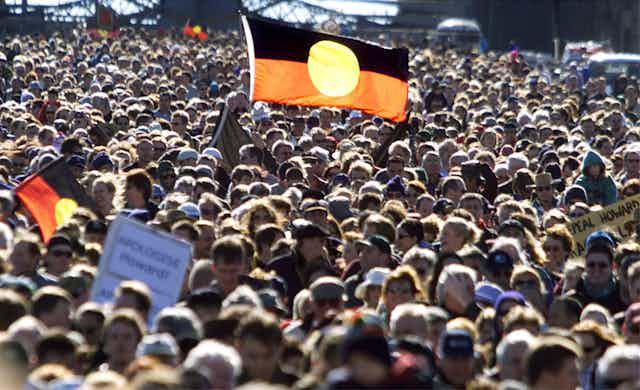Prime Minister Malcolm Turnbull has made news shedding tears over the plight of an elderly Indigenous woman. Turnbull wiped away tears during a TV interview with Stan Grant as he told of hearing a Moss Vale woman recall her mother singing to her in the Ngunawal language as a young child.
“She was a very old lady and she remembers her mother singing this (lullaby) to her,” he was reported as saying.
And the thing that’s so sad is to imagine that mother singing that story to her at a time when you were losing culture and the last thing that baby was was safe.“
While I welcome Turnbull’s concerns for the loss of Indigenous language and culture, it’s hard to miss the irony of this happening only two weeks after Bess Price was denied the right to speak her language, Warlpiri, in the Northern Territory parliament. As a nation, we mourn what has been lost, while failing to embrace and support that which we still have.
Why are Australians so resistant to embracing multilingualism, especially when it comes to our nation’s Indigenous languages? Why can we not see the value of our nation’s linguistic heritage, and the wealth that languages bring?

Language is central to what it means to be human. Each individual language reflects another way of talking about the world, another framework for solving communicative problems, another example of the cognitive capabilities of our species. Each language is also a repository of accumulated knowledge about the world; knowledge that is lost when languages are no longer spoken.
However, some stark facts illustrate quickly how fragile our linguistic diversity is: 96 per cent of the world’s languages are spoken by only 4 per cent of the world’s population. The dire predictions are that half of the world’s 7000 languages will have disappeared by the end of this century – a rate of more than 40 languages lost per year. The Asia-Pacific region is home to half of the world’s languages, 250 indigenous to our own country. All our Indigenous languages are endangered.
Some believe that language diversity is problematic, and that speaking one language produces harmony and unity. Interestingly, however, those who express this view seem to assume that it should be their language, English, that is chosen for this purpose. Would they feel equally strongly in favour of moving towards a single language if it were Mandarin, Arabic or Warlpiri?
The fact is that our mother language is intimately connected to our sense of self. It is the language in which we can fully be ourselves, where we feel most comfortable, where we can laugh and grieve and dream. This is why supporting people all over the world in speaking their own languages is so important. As stated by the United Nations:
Languages, with their complex implications for identity, communication, social integration, education and development, are of strategic importance for people and planet.
The majority of people in the world are multilingual. Mainstream Australia, however, is fiercely monolingual and wary of people who speak other languages as a part of their heritage.
This is particularly true for Australia’s Indigenous languages, which fight a constant battle for recognition and survival against the monolingual mindset of Australian policy makers.
The reaction to Bess Price’s use of Warlpiri in the Northern Territory Parliament is an all too common example of mainstream Australia’s lack of respect for our nation’s Indigenous languages.
Another is the experience of Aboriginal artist Elizabeth Close who was yelled at in a shopping centre for speaking to her child in Pitjantjatjara and told,
It’s Australia Day! We speak English in Australia.
The irony of insisting that a language from England be more closely associated with this country than one which has been spoken here for thousands of years was clearly lost on this indignant shopper.
In fact, there is a further double standard reflected in recent events, which also saw Malcolm Turnbull speak in the Ngunawal language in Federal Parliament, without permission from the chamber, and with great approval from the broader community.
Why is it that we embrace the effort from a non-Indigenous politician to symbolically use an Indigenous language, while shutting down a request from an Indigenous politician to use her own native language?
Turnbull had reportedly heard of the Moss Vale woman’s plight while learning a passage of Ngunawal language for his Closing the Gap address. In the speech, he announced A$20 million funding for the preservation of Indigenous language and culture.
This money is definitely welcome but it’s a drop in the ocean when one considers the attitudinal change that is also needed across mainstream Australia. We need to start valuing Indigenous languages as a vital part of our heritage – and recognising them as living languages that are used in everyday life.
The majority of people across the world speak at least two languages. Australia is proud of its multiculturalism. It’s time for us to catch up with the rest of the world and embrace multilingualism as well.

